Kumpulan Software Gratis | Google SketchUp Pro 8.0.14346 Full Activation | Do you still unfamiliar with this software? At first glance this software is similar to AutoCAD.
Yes, Google SketchUp Pro 8.0.14346 is a design software developed by
Google that is used to design or create a sketch in 2D, and 3D, such as
for making sketches of houses, buildings, vehicles, and many more,
and the results can also be placed on Google Earth, or can also be on display in Google 3D Warehouse. This software is typically used by architects.
and the results can also be placed on Google Earth, or can also be on display in Google 3D Warehouse. This software is typically used by architects.
Google SketchUp is an easy to use application That willl help you learn
to create 3D models of houses, sheds, decks, home additions, woodworking
projects - even space ships.
You can add details, textures and glass to your models, design with dimensional accuracy, and place your finished models in Google Earth, share them with others by posting them to the 3D Warehouse, or print hard copies. Google SketchUp is a great way to discover if 3D modeling is right for you.
SketchUp includes these tools:
· Drawing and modifying geometry: Polygon, FollowMe, Offset, and Intersect with Model.
· Construction: Dimension, Tape Measure, Protractor, Section Slice, Layers, Area & Length Calculation
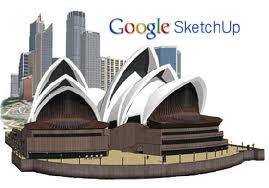
You can add details, textures and glass to your models, design with dimensional accuracy, and place your finished models in Google Earth, share them with others by posting them to the 3D Warehouse, or print hard copies. Google SketchUp is a great way to discover if 3D modeling is right for you.
SketchUp includes these tools:
· Drawing and modifying geometry: Polygon, FollowMe, Offset, and Intersect with Model.
· Construction: Dimension, Tape Measure, Protractor, Section Slice, Layers, Area & Length Calculation

Using SketchUp you can:
· Draw, modify, measure, rotate, and scale geometry.
· Place section slices to view and work on the model interiors.
· Add pre-made textures to your models, or create new ones.
· Add pre-made components like trees, cars, doors and windows, and people to your models, or create new components.
· Soften and smooth faces.
· Cast real-time shadows for any location on earth.
· Simulate movie camera placements.
· Perform walk-throughs.
· Create presentation tours.
· Import 2D images (. Jpg,. Png,. Tif,. Tga,. Bmp) and 3D models (.3 ds,. Dem,. DDF,. Dwg,. Dxf,. Skp).
· Export your models to Google Earth.
· Export 2D images of your models (. Jpg,. Bmp,. Png,. Tif).
· Print your models.
· Create add-on programs using the Ruby programming language.
SketchUp is the 3D modeling tool for design professionals
The professional version of SketchUp empowers design professionals to explore and Communicate complex design concepts.
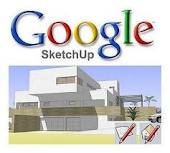
· Draw, modify, measure, rotate, and scale geometry.
· Place section slices to view and work on the model interiors.
· Add pre-made textures to your models, or create new ones.
· Add pre-made components like trees, cars, doors and windows, and people to your models, or create new components.
· Soften and smooth faces.
· Cast real-time shadows for any location on earth.
· Simulate movie camera placements.
· Perform walk-throughs.
· Create presentation tours.
· Import 2D images (. Jpg,. Png,. Tif,. Tga,. Bmp) and 3D models (.3 ds,. Dem,. DDF,. Dwg,. Dxf,. Skp).
· Export your models to Google Earth.
· Export 2D images of your models (. Jpg,. Bmp,. Png,. Tif).
· Print your models.
· Create add-on programs using the Ruby programming language.
SketchUp is the 3D modeling tool for design professionals
The professional version of SketchUp empowers design professionals to explore and Communicate complex design concepts.

SketchUp users have the ability to:
· Export models in 3DS, DWG, DXF, OBJ, XSI, VRML, and FBX file formats.
· Export animations and walkthroughs as MOV or AVI files.
· Use organic modeling (Sandbox) and Film & Stage (pre-viz) tools.
· Import and export GIS data.
· Print and export raster images at higher-than-screen resolution.
· Receive free email technical support for two years after purchase.
· Use the software for commercial purposes (the free version is approved for personal use only).
Model anything you can imagine:
Redecorate your living room. Invent a new piece of furniture. Model your city for Google Earth. There's no limit to what you can create with SketchUp.
SketchUp makes 3D modeling fun:
We believe powerful software can also be a pleasure to use - the secret is intuitive tools That Work the way you think They should. Apparently, Millions of people agree.
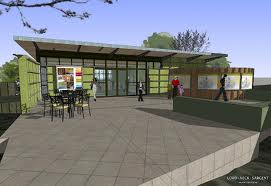
· Export models in 3DS, DWG, DXF, OBJ, XSI, VRML, and FBX file formats.
· Export animations and walkthroughs as MOV or AVI files.
· Use organic modeling (Sandbox) and Film & Stage (pre-viz) tools.
· Import and export GIS data.
· Print and export raster images at higher-than-screen resolution.
· Receive free email technical support for two years after purchase.
· Use the software for commercial purposes (the free version is approved for personal use only).
Model anything you can imagine:
Redecorate your living room. Invent a new piece of furniture. Model your city for Google Earth. There's no limit to what you can create with SketchUp.
SketchUp makes 3D modeling fun:
We believe powerful software can also be a pleasure to use - the secret is intuitive tools That Work the way you think They should. Apparently, Millions of people agree.

Get models online for free:
You can build models from scratch, or you can download what you need. People all over the world share what they've made on the Google 3D Warehouse.
Get started right away:
Dozens of video tutorials, an extensive Help Center and a worldwide user community mean That anyone who wants to Make 3D models with SketchUp, can.
NOTE: Google SketchUp is free for personal use.
Google SketchUp is a tool designed to teach you 3D modeling, whether you are a novice or experienced user.
When you enter the program, you first have to select the type of template you want to work in - simple, architectural design, Google Earth modeling, engineering, product design and woodworking, plan view, or beginning training template.
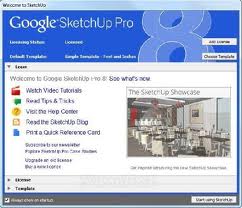
You can build models from scratch, or you can download what you need. People all over the world share what they've made on the Google 3D Warehouse.
Get started right away:
Dozens of video tutorials, an extensive Help Center and a worldwide user community mean That anyone who wants to Make 3D models with SketchUp, can.
NOTE: Google SketchUp is free for personal use.
Google SketchUp is a tool designed to teach you 3D modeling, whether you are a novice or experienced user.
When you enter the program, you first have to select the type of template you want to work in - simple, architectural design, Google Earth modeling, engineering, product design and woodworking, plan view, or beginning training template.

Google SketchUp's user interface is very accessible, and an Instructor
guides you every step of the way. In Addition, you can watch video
tutorials, or read tips and tricks.
In the toolbar menu you can select the line, rectangler, circle, arc, eraser, tape measure (to measure distances, create guide lines or points, or scale a model), or paint bucket tool (materials and assign colors to entities - asphalt and concrete, blinds, bricks, carpets, metal, stone, and others).
Plus, the push / pull tool lets you push and pull Face entities, in order to add or substract from the 3D volume models, and the move tool allows you to move, stretch or copy entities. The rotate tool enables you to rotate, stretch, distort, or copy entities along a rounded path, while the offset tool creates a copy of line at a uniform distance from originals.
If you have not managed to rotate the camera till this point, or move it vertically and horizontally, then you have probably missed the orbit and pan tools.
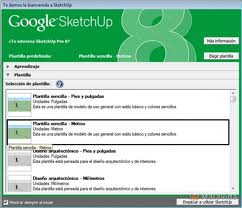
In the toolbar menu you can select the line, rectangler, circle, arc, eraser, tape measure (to measure distances, create guide lines or points, or scale a model), or paint bucket tool (materials and assign colors to entities - asphalt and concrete, blinds, bricks, carpets, metal, stone, and others).
Plus, the push / pull tool lets you push and pull Face entities, in order to add or substract from the 3D volume models, and the move tool allows you to move, stretch or copy entities. The rotate tool enables you to rotate, stretch, distort, or copy entities along a rounded path, while the offset tool creates a copy of line at a uniform distance from originals.
If you have not managed to rotate the camera till this point, or move it vertically and horizontally, then you have probably missed the orbit and pan tools.

You can also add photo textures to your models (a feature That uses
Street View photos imported from Google Maps) - add a new building (by
installing the Google Earth plugin), get models from the Internet, or
share your own creations.
Furthermore, once you create a model of That exists in reality, you can add it as a location, so SketchUp can share it online.
In conclusion, Google SketchUp proves to be a reliable and user-friendly program designed for 3D modeling. It may use a high amount of CPU and memory resources, but we still recommend you try it. It is free to use.
Key Feature:
Edges and Faces:
· Every SketchUp models is made up of just two things: edges and faces. Edges are straight lines, and faces are the 2D shapes are created when That Several edges form a flat loop. For example, a rectangular face is bound by four edges are connected That together at right angles. To build models in SketchUp, you draw edges and faces using a few simple tools you can learn That in a small amount of time. It's as simple as that.
Push / Pull: Quickly go from 2D to 3D:
· Extrude any flat surface into a three-dimensional form with SketchUp's Patented Push / Pull tool. Just click to start extruding, move your mouse, and click again to stop. You can Push / Pull a rectangle into a box. Or draw the outline of a staircase and Push / Pull it into 3D. Want to make a window? Push / Pull a hole through your wall. SketchUp is known for being easy to use, and Push / Pull is the reason why.
Accurate measurements:
· SketchUp is great for working fast and loose in 3D, but it's more than just a fancy electronic pencil. Because you're working on a computer, everything you create in SketchUp has a precise dimension. When you're ready, you can build models That are as accurate as you need them to be. If you want, you can print scaled views of your model, and if you have SketchUp Pro, you can even export your geometry into other programs like AutoCAD and 3ds MAX.
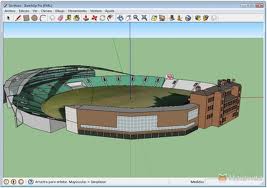
Furthermore, once you create a model of That exists in reality, you can add it as a location, so SketchUp can share it online.
In conclusion, Google SketchUp proves to be a reliable and user-friendly program designed for 3D modeling. It may use a high amount of CPU and memory resources, but we still recommend you try it. It is free to use.
Key Feature:
Edges and Faces:
· Every SketchUp models is made up of just two things: edges and faces. Edges are straight lines, and faces are the 2D shapes are created when That Several edges form a flat loop. For example, a rectangular face is bound by four edges are connected That together at right angles. To build models in SketchUp, you draw edges and faces using a few simple tools you can learn That in a small amount of time. It's as simple as that.
Push / Pull: Quickly go from 2D to 3D:
· Extrude any flat surface into a three-dimensional form with SketchUp's Patented Push / Pull tool. Just click to start extruding, move your mouse, and click again to stop. You can Push / Pull a rectangle into a box. Or draw the outline of a staircase and Push / Pull it into 3D. Want to make a window? Push / Pull a hole through your wall. SketchUp is known for being easy to use, and Push / Pull is the reason why.
Accurate measurements:
· SketchUp is great for working fast and loose in 3D, but it's more than just a fancy electronic pencil. Because you're working on a computer, everything you create in SketchUp has a precise dimension. When you're ready, you can build models That are as accurate as you need them to be. If you want, you can print scaled views of your model, and if you have SketchUp Pro, you can even export your geometry into other programs like AutoCAD and 3ds MAX.

Follow Me:
· You use SketchUp's innovative, do-everything Follow Me tool to create 3D forms by extruding 2D surfaces along predetermined paths. Model a bent pipe by extruding a circle along an L-shaped line. Create a bottle by drawing half of its outline, then using Follow Me to sweep it around a circle. You can even use Follow Me to round off (fillet) edges on Things like handrails, furniture and electronic gadgets.
Paint Bucket:
· You can use SketchUp's Paint Bucket tool to paint your models with materials like colors and textures.
Groups and Components:
· By "sticking together" parts of the geometry in your models to the make Groups, you can create sub-objects That are Easier to move, copy and hide. Components are a lot like Groups, but with a handy twist: copies of Components are related together, so changes you make to one are automatically reflected in all the others. Windows, doors, trees, chairs and other Things Millions of benefit from this behavior.
Shadows:
· SketchUp's powerful, real-time Shadow Engine lets you perform accurate shade studies on your models.
Sections:
· You can use SketchUp's interactive Sections feature to temporarily cut away parts of your design, enabling you to look inside. You can use Sections to create orthographic views (like floorplans), to export geometry to CAD programs using SketchUp Pro, or just to get a better view of your models while you're working on it. Section Planes can be moved, rotated and even animated using SketchUp's Scenes feature.
Scenes:
· We created Scenes to enable you to easily save precise views of your models so you can come back to them later. Need to create an animation? Just create a few Scenes and click a button.
Look Around and Walk:
· SketchUp lets you get inside your models with a set of simple navigation tools designed to give you a first-person view. Click with Position Camera to "be standing" anywhere in your model. Use Look Around to turn your virtual head. Finally, switch to Walk to explore your creation on foot; you can even climb and descend stairs and ramps, just like you're playing a video game.
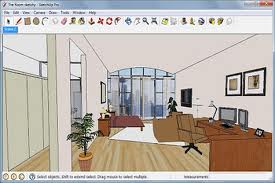
· You use SketchUp's innovative, do-everything Follow Me tool to create 3D forms by extruding 2D surfaces along predetermined paths. Model a bent pipe by extruding a circle along an L-shaped line. Create a bottle by drawing half of its outline, then using Follow Me to sweep it around a circle. You can even use Follow Me to round off (fillet) edges on Things like handrails, furniture and electronic gadgets.
Paint Bucket:
· You can use SketchUp's Paint Bucket tool to paint your models with materials like colors and textures.
Groups and Components:
· By "sticking together" parts of the geometry in your models to the make Groups, you can create sub-objects That are Easier to move, copy and hide. Components are a lot like Groups, but with a handy twist: copies of Components are related together, so changes you make to one are automatically reflected in all the others. Windows, doors, trees, chairs and other Things Millions of benefit from this behavior.
Shadows:
· SketchUp's powerful, real-time Shadow Engine lets you perform accurate shade studies on your models.
Sections:
· You can use SketchUp's interactive Sections feature to temporarily cut away parts of your design, enabling you to look inside. You can use Sections to create orthographic views (like floorplans), to export geometry to CAD programs using SketchUp Pro, or just to get a better view of your models while you're working on it. Section Planes can be moved, rotated and even animated using SketchUp's Scenes feature.
Scenes:
· We created Scenes to enable you to easily save precise views of your models so you can come back to them later. Need to create an animation? Just create a few Scenes and click a button.
Look Around and Walk:
· SketchUp lets you get inside your models with a set of simple navigation tools designed to give you a first-person view. Click with Position Camera to "be standing" anywhere in your model. Use Look Around to turn your virtual head. Finally, switch to Walk to explore your creation on foot; you can even climb and descend stairs and ramps, just like you're playing a video game.

Dimensions and Labels:
· You can use the super-intuitive Dimension and Label tools to add dimensions, annotations and other glorious detail to your work.
The Instructor:
· SketchUp's Instructor dialog box, the which you can choose to activate at any time, provides context-sensitive help.
Layers and the Outliner:
When you're building a big, complicated model, Things can get messy very Quickly. SketchUp provides two useful Airways to keep your geometry manageable:
Google Earth:
· SketchUp and Google Earth are part of the same product family, meaning you can exchange information easily Between Them. Need a building site for your project? Import a scaled aerial photograph, Including topography, directly from Google Earth to SketchUp by clicking one button. Want to see your SketchUp model in context in Google Earth? Click another button, and you can. Anyone can use SketchUp to build models the which can be seen by anyone in Google Earth.
Sandbox tools:
· SketchUp's Sandbox tools let you create, optimize and alter 3D terrain. You can generate a smooth landscape from a set of imported contour lines, add berms and valleys for runoff, and create a building pad and driveway.
3D Warehouse:
· The Google 3D Warehouse is a huge, online repository of 3D models the which you can search through when you need something. Why build something when you can download it for free?
3DS Import:
· You can import 3DS files directly into your SketchUp models. Have a piece of furniture in 3DS format you'd like to use That? Import it in, then keep on truckin '.
Import images:
· With SketchUp, you can import image files like JPGs, TIFFs, PNGs and PDFs. You can use them by Themselves (kind of like posters), but you can also stick them to surfaces to create photo-realistic models of buildings, package designs, and more.
Export TIFF, JPEG and PNG:
· SketchUp lets you export raster images up to 10.000 pixels square, so generating an image of the which you can send in an email, publish in a document, or project on a wall is as easy as choosing a few options and clicking Export.
Requirements:
· 1 GHz processor
· 1 GB RAM
· 300 MB of free hard-disk space
· 3D class Video Card with 256 MB of memory or higher
· Windows compatible pointing device
· Microsoft ® Internet Explorer 7.0 or higher
·. NET Framework version 2.0

· You can use the super-intuitive Dimension and Label tools to add dimensions, annotations and other glorious detail to your work.
The Instructor:
· SketchUp's Instructor dialog box, the which you can choose to activate at any time, provides context-sensitive help.
Layers and the Outliner:
When you're building a big, complicated model, Things can get messy very Quickly. SketchUp provides two useful Airways to keep your geometry manageable:
Google Earth:
· SketchUp and Google Earth are part of the same product family, meaning you can exchange information easily Between Them. Need a building site for your project? Import a scaled aerial photograph, Including topography, directly from Google Earth to SketchUp by clicking one button. Want to see your SketchUp model in context in Google Earth? Click another button, and you can. Anyone can use SketchUp to build models the which can be seen by anyone in Google Earth.
Sandbox tools:
· SketchUp's Sandbox tools let you create, optimize and alter 3D terrain. You can generate a smooth landscape from a set of imported contour lines, add berms and valleys for runoff, and create a building pad and driveway.
3D Warehouse:
· The Google 3D Warehouse is a huge, online repository of 3D models the which you can search through when you need something. Why build something when you can download it for free?
3DS Import:
· You can import 3DS files directly into your SketchUp models. Have a piece of furniture in 3DS format you'd like to use That? Import it in, then keep on truckin '.
Import images:
· With SketchUp, you can import image files like JPGs, TIFFs, PNGs and PDFs. You can use them by Themselves (kind of like posters), but you can also stick them to surfaces to create photo-realistic models of buildings, package designs, and more.
Export TIFF, JPEG and PNG:
· SketchUp lets you export raster images up to 10.000 pixels square, so generating an image of the which you can send in an email, publish in a document, or project on a wall is as easy as choosing a few options and clicking Export.
Requirements:
· 1 GHz processor
· 1 GB RAM
· 300 MB of free hard-disk space
· 3D class Video Card with 256 MB of memory or higher
· Windows compatible pointing device
· Microsoft ® Internet Explorer 7.0 or higher
·. NET Framework version 2.0

What's new in Google SketchUp 8.0.3117:
September 1st, 2010
Model of geo-location with Google Maps:
· We've built Maps right into SketchUp. Adding a geo-location to your models is now an elegant, one-app process.
Color imagery and more accurate terrain:
· The snapshot you get when you add a geo-location to your models now includes 3D terrain data that's more accurate, and - for the first time - in aerial color imagery.
Photo Match improvements:
· Our Photo Match feature lets you trace one or more photographs to build a model; it's an incredibly powerful tool. For SketchUp 8, we've tweaked some of Things to Make using Photo Match Easier than ever.
SketchUp, meet Building Maker:
· When it comes to modeling existing buildings, it's hard to beat Google Building Maker for speed and efficiency. We've made it Simpler to open and refine Building Maker models in SketchUp.
Thumbnails scene:
· Would not it be nice if the Scenes Panel included little image previews of the scenes in your model? Your wish is our command.
Back Edges:
· Turn these on to see your Model's Obscured edges as dashed lines. A great alternative to Wireframe or X-ray mode when you need to be Able to see through your model.
Push / Pull pre-selected faces:
· Select a face, then push / pull; it works just like the rest of SketchUp's modification tools. Super handy when you do not want to change your point of view.
Calculate volumes:
· Entity Info now displays the volume of any solid in your model. Volumes are also included in reports you generate with SketchUp Pro.
Outer Shell:
· Automatically generate a shape That completely encloses two or more solids in your model. It's a little like shrink-wrapping your geometry. Did someone say 3D printing?
September 1st, 2010
Model of geo-location with Google Maps:
· We've built Maps right into SketchUp. Adding a geo-location to your models is now an elegant, one-app process.
Color imagery and more accurate terrain:
· The snapshot you get when you add a geo-location to your models now includes 3D terrain data that's more accurate, and - for the first time - in aerial color imagery.
Photo Match improvements:
· Our Photo Match feature lets you trace one or more photographs to build a model; it's an incredibly powerful tool. For SketchUp 8, we've tweaked some of Things to Make using Photo Match Easier than ever.
SketchUp, meet Building Maker:
· When it comes to modeling existing buildings, it's hard to beat Google Building Maker for speed and efficiency. We've made it Simpler to open and refine Building Maker models in SketchUp.
Thumbnails scene:
· Would not it be nice if the Scenes Panel included little image previews of the scenes in your model? Your wish is our command.
Back Edges:
· Turn these on to see your Model's Obscured edges as dashed lines. A great alternative to Wireframe or X-ray mode when you need to be Able to see through your model.
Push / Pull pre-selected faces:
· Select a face, then push / pull; it works just like the rest of SketchUp's modification tools. Super handy when you do not want to change your point of view.
Calculate volumes:
· Entity Info now displays the volume of any solid in your model. Volumes are also included in reports you generate with SketchUp Pro.
Outer Shell:
· Automatically generate a shape That completely encloses two or more solids in your model. It's a little like shrink-wrapping your geometry. Did someone say 3D printing?
